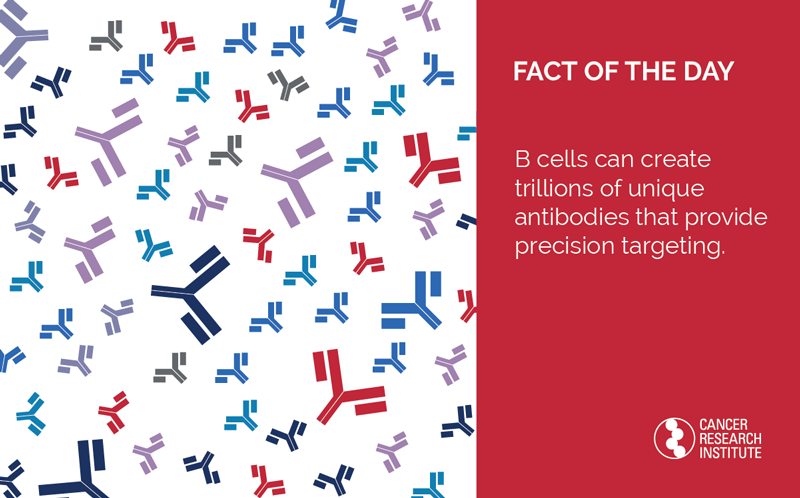
B cells can create trillions of unique antibodies that provide precision targeting.
As we mentioned earlier, the immune system uses the MHC/antigen system to target tumors. While both B and T cells are activated through the MHC/antigen system, once activated they go after tumors in distinct ways.
Whereas T cells physically attach to and attack cancer cells, B cells target them indirectly through the production of molecules called antibodies (that can bind to tumor antigens). The specific, powerful binding of these antibodies can then disrupt crucial growth signaling pathways (by blocking their surface receptors) as well as mark the cancer cells for destruction by other immune cells.
B cells also have proteins called RAGs (recombination-activating genes) that enable them to rearrange the components of antibodies and customize their shapes. With the help of these RAGs, which were first discovered by Susumu Tonegawa, Ph.D., it’s been estimated that B cells have the potential to synthesize over 1012 (one trillion!) distinct antibodies.
Unfortunately, abnormal RAG activity can also cause cancer-promoting mutations in B cells, and is believed to contribute to the development of lymphoma. This connection was discovered by Frederick W. Alt, Ph.D. and Klaus Rajewsky, M.D.
Outside of B cells, scientists now also have the ability—thanks in part to Jeffrey V. Ravetch, M.D., Ph.D.— to produce synthetic, customized antibodies for cancer immunotherapy. Over a dozen of these have already been approved by the FDA, for many diverse cancer types. Examples include anti-CD20 antibodies for leukemia and lymphoma and anti-HER2 antibodies for breast cancer.
The following CRI-funded scientists are working to better understanding the factors that govern B cell activity and antibody-production, with a focus on developing strategies to prevent and/or treat cancer in the clinic:
Image credit: Cancer Research Institute